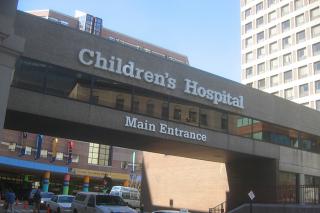Simmons School of Nursing students Rachel Takes ’24MSN and Elizabeth Strager ’19 ’21MSN, FNP- C, ’25DNP were recruited by Associate Professor Patricia Rissmiller into the Leadership Education in Neurodevelopmental and Related Disabilities Program (LEND Boston) at Boston Children's Hospital’s Institute for Community Inclusion. LEND Boston is an inter-professional training program that prepares graduate students to work with children with developmental and neurodevelopmental disorders, providing training and a stipend. We spoke to Takes and Strager about their experiences.
“I knew for a long time that I wanted to be a nurse,” says Elizabeth Strager ’19 ’21MSN, FNP-C, ’25DNP. “It seemed like a natural path for me, either medical school or nursing school.”
Strager chose to study nursing, as the focus on patient care appealed to her. She chose Simmons School of Nursing for its Accelerated 4+1 BSN and MSN, and clinical rotations at Boston hospitals. “[Simmons students] train at the best hospitals in the country. That was definitely an incentive for me. Also, everyone at Simmons was so welcoming. The classes were small, and I was close to all of my professors.” Strager is now on her way to becoming a Triple Shark, currently in the Online Doctor of Nursing Practice Program (DNP).
Rachel Takes ’24MSN, a Registered Nurse in the Pediatric Epilepsy Program at Massachusetts General Hospital in the Department of Neurology, caring for individuals with complex epilepsy through the use of medication and low glycemic index treatment, and supporting research efforts by monitoring patients who are undergoing innovative treatments to manage their epilepsy. Takes was drawn to nursing as a career to help people. “It’s a privileged position to be in, to provide care to people in their most vulnerable moments,” says Takes, who pursued allied health sciences and clinical psychology in her undergraduate studies. “After college, I worked at Boston Children’s Hospital. I found that I liked working one on one with kids and families. I started my Master’s in Nursing at Simmons as a second career.”
Both Strager and Takes were connected to the LEND Program by Associate Professor Patricia Rissmiller, who is, herself, a LEND alum. The program began with a lecture series about different developmental disabilities, delivered by experts in the field. These training sessions prepared them for a disability seminar in Washington D.C., which Takes and Strager attended in April. “We had the opportunity to share what we’ve learned and bring our different expertise together, meeting with lawmakers and staffers,” Takes says about the D.C. seminar. “There is a policy element to the LEND program. We’re taking what we learned and applying it to advocacy for different conditions.”
For Strager, the opportunities to speak with parents of children with disabilities was particularly powerful. “We were able to learn firsthand what their experiences have been,” she says. Takes was able to meet patients via Zoom and in person. “The [patient’s] mom was a LEND Fellow, as well,” she notes. “As a nurse, it was valuable to hear from the families what they need to feel supported and cared for by their providers. We were able to ask questions, during a time in their lives when things were calm, and learned what we can do as providers to offer the best care possible.”
In addition, many faculty in the LEND program work clinical jobs at Boston Children’s. Students are invited to shadow them during the week. Strager previously worked at Boston Children’s Hospital on the Solid Organ Transplant floor caring for children with both physical and mental disabilities. Strager is currently working at a primary care practice where she sees a lot of adults with disabilities that have not been formally diagnosed. “[The LEND training] has given me a better idea of what different diagnoses need, and where to refer patients.”
For Takes, the LEND Program has influenced the trajectory of her career. “When I applied, there were a few different directions I was considering,” says Takes. “Learning about all of these conditions was invaluable. We also learned about community organizations that came and shared what they do. I learned that nurse practitioners could work in different settings, and connected with groups that I may not have otherwise run into.”
As part of the LEND program, participants are paired with community based organizations aligned with their interests. Takes has served as the Deputy Ambassador for the state of Massachusetts within the Massachusetts Act Early Coalition. “In this position, I used my nursing knowledge to educate parents, early childhood and education professionals, and other healthcare providers about developmentally appropriate milestones and how to recognize signs of developmental disabilities. I also helped organize the nationally recognized 2024 Week of the Young Child in April, by conducting outreach and managing social media platforms, and overseeing surveys and data collection to assess training efficacy.” Overall, the experience inspired Takes to pivot toward a career in developmental medicine.
For Strager, the doctoral program is helping her focus on data analysis and application to real world situations. “I feel empowered to prove the need for [resources] and advocate for change based on the data collected,” says Strager. “Ultimately, I don’t know if I’ll go into research, but it’s valuable to understand how to use that research as a tool to advocate for change. Now, everything I do is clinically backed by some research study. My thoughts [on nursing] keep evolving with the program.”
Strager and Takes are enthusiastic about their experiences at Simmons, and through the LEND program. “If you have a personal connection with somebody who is struggling with a disability, this program will leave you feeling empowered to help them,” says Strager. Takes also praises the flexibility of the nursing programs at Simmons. “I’ve been able to fit my studies into my work as a nurse,” she says. “And I’m finding Simmons graduates everywhere I look in the Boston nursing community!”

